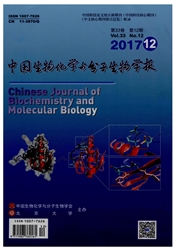

 中文摘要:
中文摘要:
过氧化物酶体增殖物激活受体γ(peroxisome proliferator-activated receptorγ,PPAR-γ)通路是调节替换活化的(alternatively activated)M2型巨噬细胞极化的中心环节.姜黄素是PPAR-γ的天然激动剂,有着良好的抗炎作用.本研究通过建立巨噬细胞株的体外炎症模型,用姜黄素及PPAR-γ的特异性抑制剂GW9662对其进行干预,观察巨噬细胞株极化状态的改变.结果显示,姜黄素可以促使巨噬细胞向M2型极化,当特异性抑制PPAR-γ通路后,姜黄素促进巨噬细胞向M2型极化的作用受到抑制.结果表明,姜黄素可能是通过激动PPAR-γ通路促使巨噬细胞向M2型极化,为进一步研究姜黄素的抗炎机制及治疗慢性低度炎症相关的代谢性疾病提供了一个新的思路.
 英文摘要:
英文摘要:
Peroxisome proliferator-activated receptor γ( PPAR-γ) pathway is the central link that regulates alternative activation( M2) macrophages polarization. Curcumin has a good anti-inflammatory effect as a natural PPAR-γ agonist. This study established a model of macrophage inflammatory in vitro,and intervened with curcumin and specific PPAR-γ inhibitor GW9662 to observe macrophage polarization. The results showed that curcumin promoted M2 macrophages polarization,and this effect was suppressed after inhibiting PPAR-γ. These findings suggested that curcumin might induce M2 macrophage polarization through activating PPAR-γ pathways. It provided a new perspective for the further study of anti-inflammatory mechanism of curcumin and treatment of metabolic diseases associated with chronic low-grade inflammation.
 同期刊论文项目
同期刊论文项目
 同项目期刊论文
同项目期刊论文
 期刊信息
期刊信息
